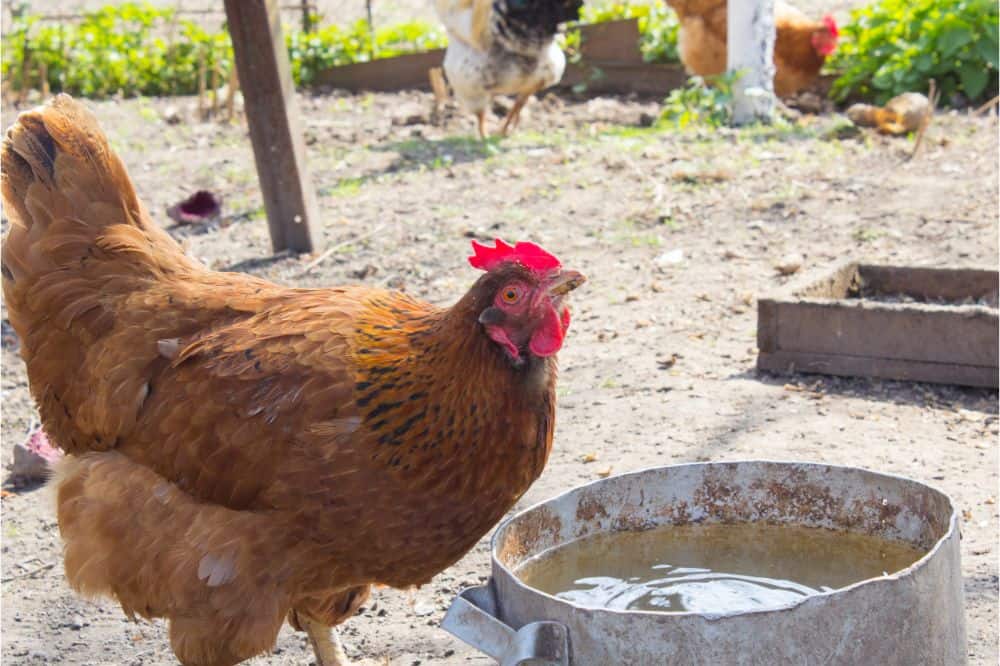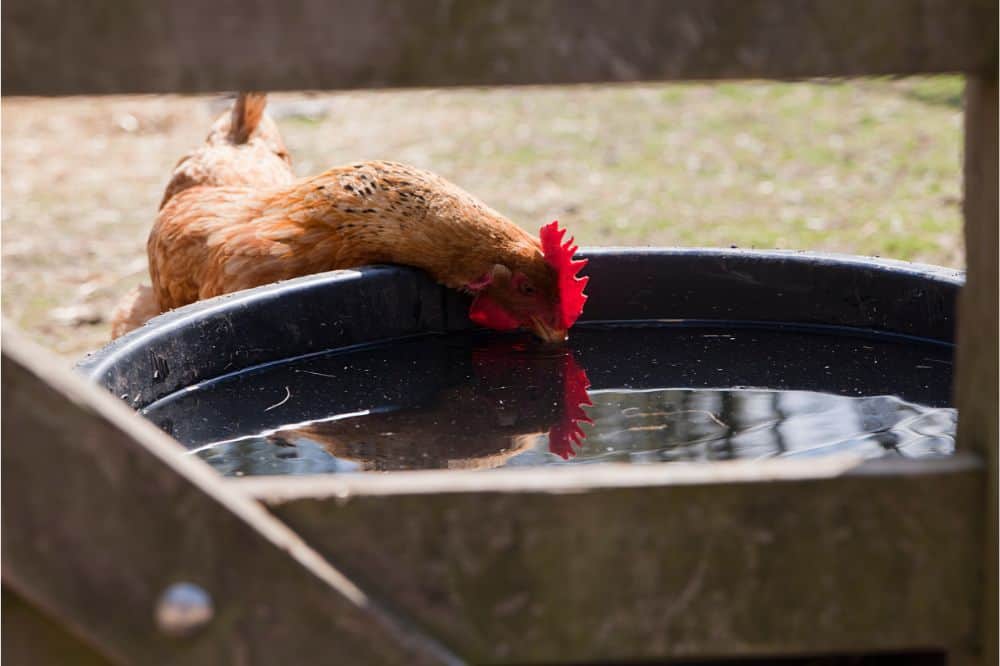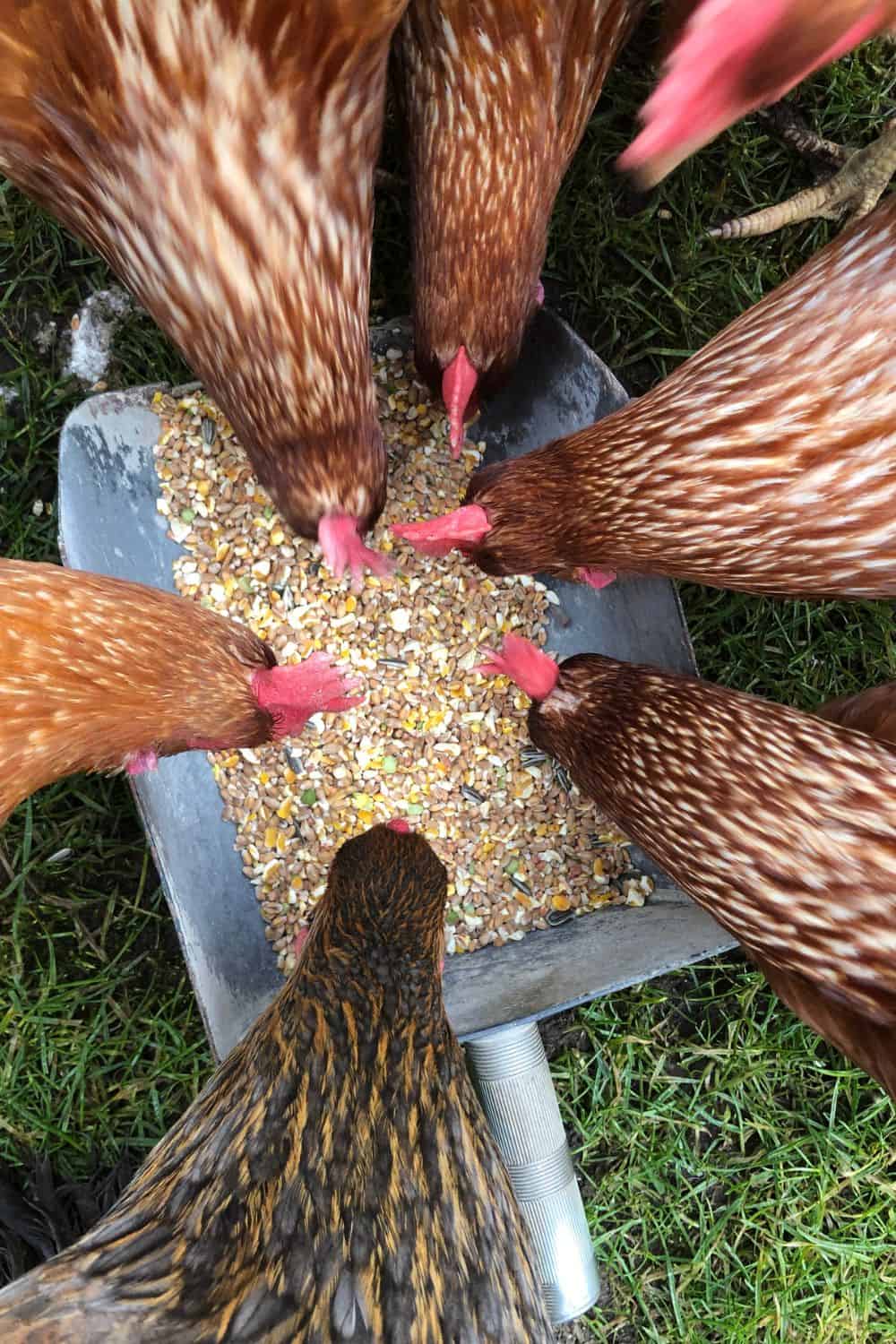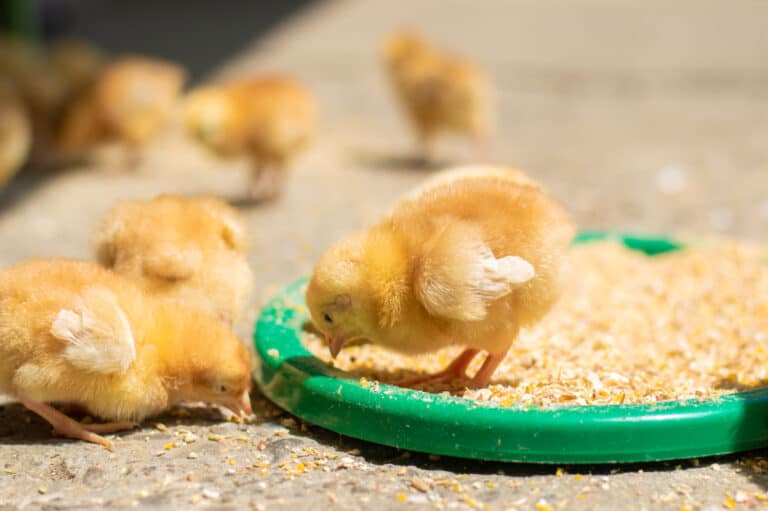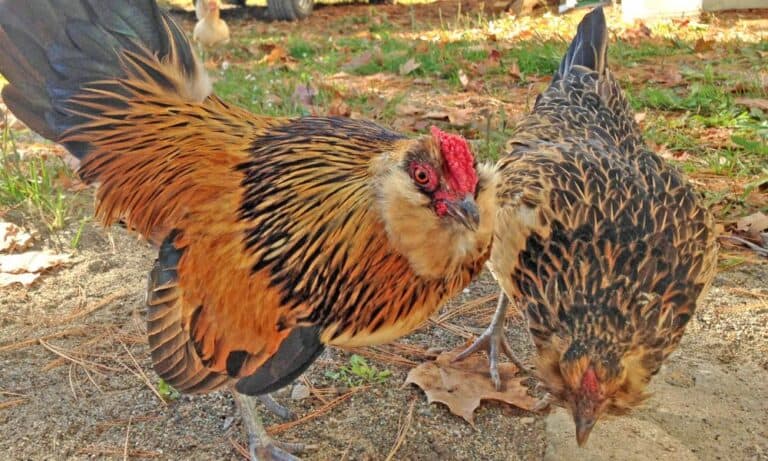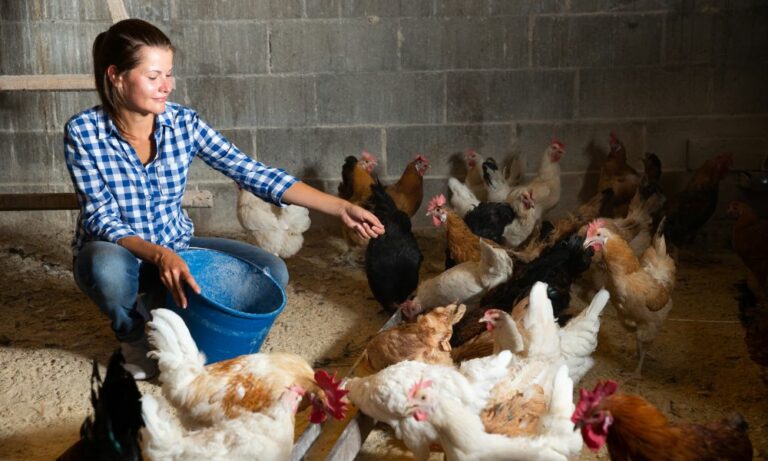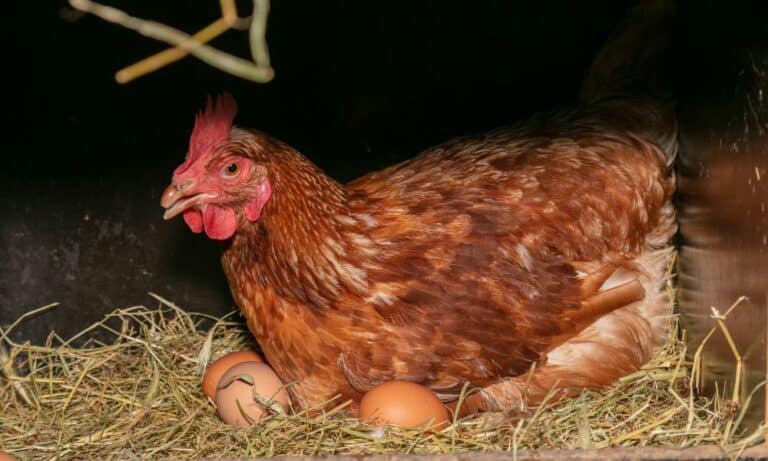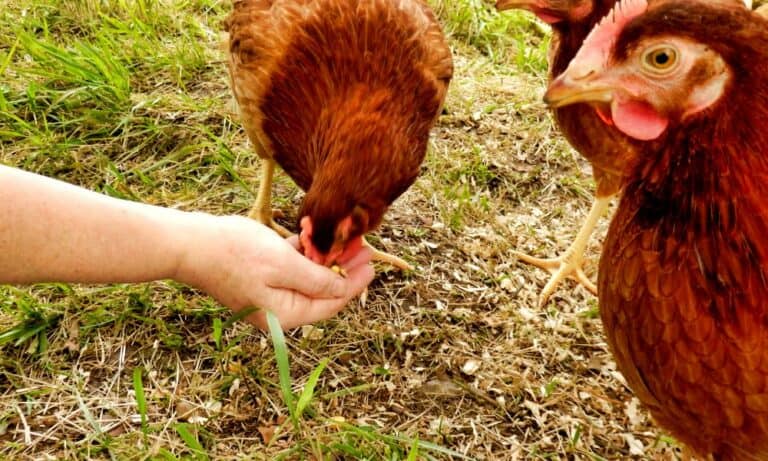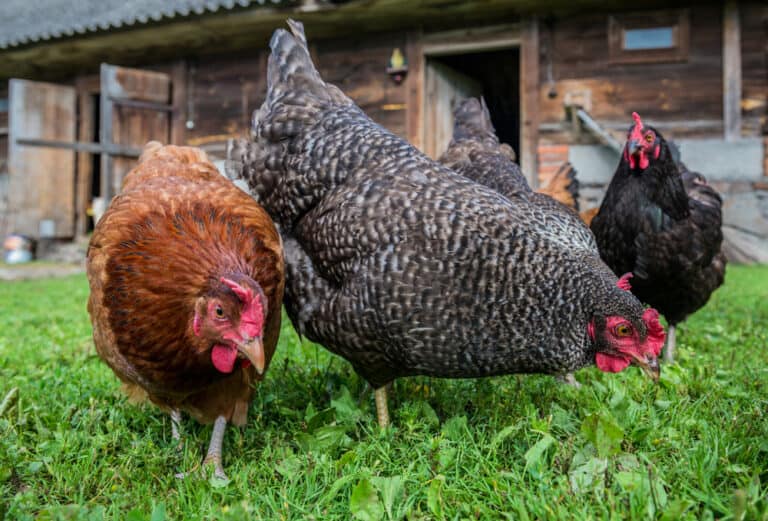Like other creatures, chickens require enough food and water to grow, reproduce, and stay healthy. How long can a chicken go without water or food depends on their age, breed, living conditions, and weather. In most cases, they can survive a few days without a feed but often die earlier without access to water.
Since keeping chickens is a full-time commitment, you should organize your time to regularly provide enough food and water to them when going somewhere. Remember that fowl left outside have more chances to survive than those kept inside and forced to rely solely on you. Let’s take a look.
The period of chicken survival without water |
|
| Chicken age | Period |
| Newborn hatchlings | 48 to 72 hours |
| Chicks | Up to 6 hours, depending on temperatures |
| Free-range adults | Indefinitely with free access to water |
| Cooped adults | 8 to 16 hours in summer and 36 to 48 hours in mild weather |
How Long Can Chickens Go Without Water?
The exact period of how long chickens can survive without water depends on their health conditions, breed, and environment. Their endurance also depends on egg production level and whether they go through the molting period.
When the temperatures are mild without humidity, chickens can survive two, rarely three days without water. On the other hand, they can’t live more than 8 to 12 hours in enclosures with high temperatures and humidity when deprived of water.
Once the outside temperatures are over 100 F (37.8 C), the flock survival rate is reduced to a minimum after only a few hours. The situation gets worse when it is exposed to direct sun.
Be aware that fowl tolerate cool weather better because they don’t have sweat glands and have problems coping with high temperatures. That makes fresh water crucial for their cooling.
Laying hens are particularly sensitive to a lack of water. Since each egg contains approximately 70% water, they need to be well-dehydrated to continue production. Laying eggs stops almost immediately after the last access to a water source.
During the day
Chickens require water daily to stay healthy, grow properly, and lay eggs regularly. If you have a sizable flock and live in a warmer climate, you should provide fresh water to your fowl three to four times a day.
Even in colder regions, changing the water in all drinkers at least once a day is advisable. If you keep free-range chickens, they can use rainwater when necessary, while birds kept indoors don’t have such a possibility.
Overnight
Chickens are diurnal birds, and they can survive without water overnight. Therefore, avoid leaving a drinker inside a coop to prevent a mess, mold development, attracting rodents, and possible bacterial infections in poultry.
On the other hand, chicks dehydrate fast, so you should provide them with enough fresh water around the clock.
In the winter
Chickens need less water when the temperatures are lower in the winter. However, even in such conditions, they can’t survive more than 72 hours without water and typically die from dehydration.
Those from free-range can eat snow to replenish fluid, but it lowers their body temperature and prevents them from getting warm. On the other hand, chicks have equal chances, regardless of outdoor temperatures. They need water, and its lack kills them within a few hours.
How long can chicks survive without water?
Chicks can’t live without water for long and start showing first signs of trouble after six hours. The problem is their fast metabolism that forces these tiny creatures to drink more than adults.
You can expect the weakest to begin dying soon after. Only a few can survive without water for more than 12 hours, especially when the outside temperatures are high enough.
The situation is better with newborn hatchlings. Most can survive without water for at least two days, particularly when the temperature is adequate. The reason is the reserves from eggs that can last up to 72 hours.
How Much Water Do Chickens Need?
An average chicken requires 6 to 8.5 ounces (180 – 250 ml) of water daily, depending on its size, breed, season, and living conditions. Most fowl drink less water in winter. However, free-range chickens need at least 17 ounces (500 ml) of water to stay properly hydrated.
An adult hen needs about 1 pint (475 ml) of water a day. However, you should provide at least 2 pints (0.95 l) of water daily when the outside temperatures are over 100 F (37.8 C).
Because of their high growth rate, broilers typically require more water than adult chickens. Believe it or not, they can drink up to 33 ounces (975 ml) daily.
Importance of Water to Chickens
Regular water access is crucial for chickens to survive. Besides regular hydration, it enables normal food digestion since fowl are incapable of swallowing and using dry food. Paradoxically, lack of water lead to the death of starvation. Water has numerous benefits for chickens, including:
1. Hydration
Chickens’ bodies require fresh water to stay hydrated. It also allows them to get enough energy for everyday activities, including molting, running, playing, flying, mating, and laying eggs.
2. Egg laying
Without water, hens stop laying eggs almost immediately. Moreover, they can’t continue standard production for at least two weeks after establishing a regular water supply. Even these first-laid eggs contain less water and are unusable for hatching chicks.
3. Digestion
Water is vital in chickens’ digestive process since it keeps the food in their crops moistened. Without liquid, crops become dry, making digestion impossible.
4. Temperature regulation
Water regulates chickens’ body temperature and keeps them cool, healthy, and active, regardless of the outside temperature. Without regular access to water, free-range fowl spend most of their time under the shade instead of looking for food.
In similar conditions, enclosed chickens quickly start suffering from body overheating. When the lack of water lasts longer, they die from dehydration.
5. Waste removal
As you know, chickens are not picky eaters and often swallow whatever they notice. Therefore, regular water intake is crucial for keeping their poop moist regardless of what they eat. That way, fowl can eliminate their droppings more effortlessly.
How Long Can Chickens Go Without Food?
Free-ranging chickens can find food on their own and survive indefinitely when access to water is accessible. On the other hand, captured fowl have a problem when left without regular feeding. In such conditions, they can’t survive for more than 3 to 5 days.
Hens start eating their own eggs approximately three days after the last meal, and you can expect the first cases of cannibalism after the fourth day.
The period of chicken survival without food when access to water is provided |
||
| Chicken age | Temperatures below 75 F (24 C) | Temperatures over 75 F (24 C) |
| Newborn hatchlings | Up to 72 hours | 48 to 72 hours |
| Chicks | About 48 hours | 12 to 24 hours |
| Free-range adults | Indefinitely with free access to water | Indefinitely with free access to water |
| Cooped adults | 3 to 5 days | 3 to 5 days |
Free-ranging chickens
The rule of thumb is that there is no need to commercially feed free-ranging chickens when they have unlimited access to water. During the summer, when they have plenty of greenery, insects, and worms at their disposal, your fowl will find a way to survive without your help.
The most significant problem is the lack of calcium for laying hens, but some grit in the yard can successfully solve that. The situation is a bit more complicated in the winter when your help is welcome. However, never underestimate this species since most chickens can survive by relying on their resourcefulness.
Chickens living in an enclosed run
The situation is quite the opposite when you keep chickens in an enclosed run. In such a situation, they have fewer possibilities to find food, like weeds, bugs, and worms, and depend on the grain mix feed you provide.
You can expect your fowl to survive a few days after running out of food sources, but the following situation can be horrifying. Hungry chickens soon attack eggs and their own offspring.
Finally, the strongest start attacking the weakest flock members, and you can expect them to eat each other at a certain point. Rare adult chickens can survive more than 4 to 5 days, regardless of the outside temperature.
Lost and trapped chickens
Trapped and lost chickens, as well as those living inside without access to the outdoor world, have no chance to find food. They entirely depend on humans, meaning their survival chances without food are virtually non-existing.
Chicks
Depending on the temperature, the newly hatched can survive 48 to 72 hours without food. That happens thanks to the albumin and moisture sources they get from eggs.
Later, fast metabolism forces chicks to eat more frequently than adults, meaning they rarely survive without food for more than a day. That period is shorter in the summer when temperatures are over 75 F (24 C).
Summary
Chickens need a constant water supply but can survive a few days without food, depending on age, breed, and weather conditions. However, chicks are more sensitive, need to eat every six hours, and have unlimited access to water. Things worsen when the temperatures are high since most chickens die when the weather is too hot.

